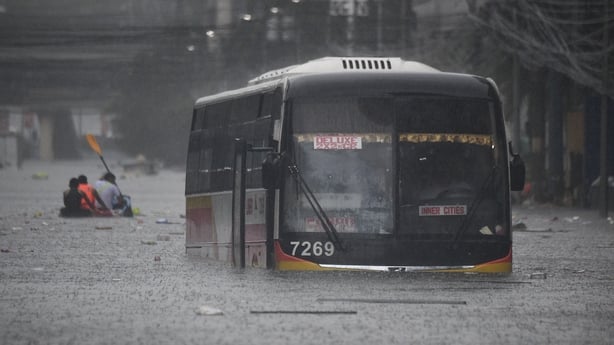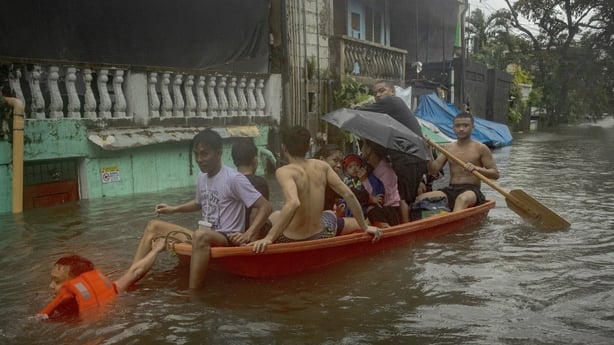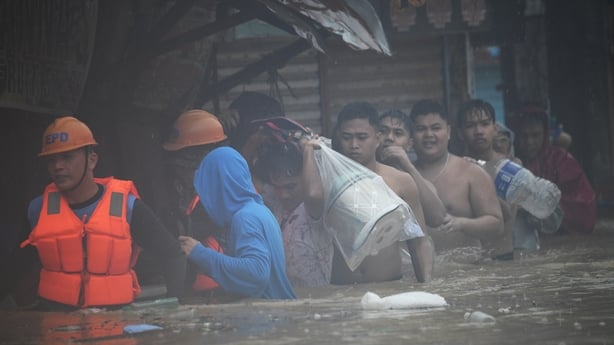Taiwan has closed schools and evacuated thousands from their homes ahead of Typhoon Gaemi, which authorities said could be "the strongest" to hit in eight years and has already killed two people on the island.
The typhoon also exacerbated seasonal rains in nearby Philippines, triggering flooding and landslides that killed six.
Gaemi, with sustained wind speeds of 190km per hour, is forecast to hit northeast Taiwan tonight.
However, a forecaster with Taiwan's Central Weather Administration said the typhoon was "spinning at a slower speed so the precise time is difficult to determine".
"Gaemi is expected to be the strongest typhoon in eight years to make landfall in Taiwan since Typhoon Nepartak," forecaster Huang En-hong said, referring to a 2016 superstorm that killed three and injured hundreds.

The typhoon had caused torrential rain and whipped up winds across Taiwan before its arrival, killing one motorist in southern Kaohsiung city who was crushed by a falling tree, and a woman in eastern Hualien, authorities said.
More than 200 people had been injured by this evening, authorities said.
President Lai Ching-te, who took part in a morning emergency briefing, urged the public to "put safety first" during what would be the first typhoon to make landfall in Taiwan this year.
"I hope that through our joint efforts, impact from the typhoon can be minimised... I also encourage fellow citizens across the country not to go out unless necessary during the typhoon, especially not to dangerous places," President Lai said.

The weather forced the self-ruled island to cancel some of its annual Han Kuang war games, which test preparedness for a Chinese invasion, but an anti-landing drill went ahead as scheduled this morning on Penghu island, west of Taiwan.
By 8pm (1pm Irish time), authorities had evacuated more than 8,000 people living in precarious conditions across Taiwan, particularly Hualien, a mountainous area with a high risk of landslides.
Trains and ferry services were suspended and hundreds of international and domestic flights were cancelled.
"We expect that the impact of the typhoon will be extended to four days (until Friday)," said Taiwan's Central Weather Administration chief Cheng Jia-ping, adding that the public would need to "take precautions against heavy rain and strong wind".

Gaemi was expected to pass through the Taiwan Strait and hit China by tomorrow in eastern Zhejiang and Fujian provinces, where authorities have issued a red storm alert.
Gaemi swept past the Philippines, exacerbating seasonal monsoons and triggering widespread flooding in Manila that turned streets into rivers.
Landslides killed six in provinces surrounding Manila, police and disaster officials said.
Weather authorities in Japan's southern island region of Okinawa urged residents to "exercise strong vigilance" against storms, high waves and floods.
Massive waves crashed ashore in Taiwan's northeastern Yilan county, while strong gusts whipped the rain sideways and sent signs flying.
A fisher surnamed Hsu tied down his boat at a typhoon shelter in a harbour crowded with docked vessels.
"I am worried about the typhoon, the boats are my tool for making money," he said.
Government offices were closed and streets emptied in the capital Taipei, while some stores had their entrances sandbagged to prevent potential floodwater.
Taiwanese chip giant TSMC, the world's largest contract chipmaker, said it would maintain normal production and the firm "has activated routine typhoon alert preparation procedures" at all fabrication plants.
Taiwan is accustomed to frequent tropical storms from July to October but experts say climate change has increased their intensity, leading to heavy rains, flash floods and strong gusts.


